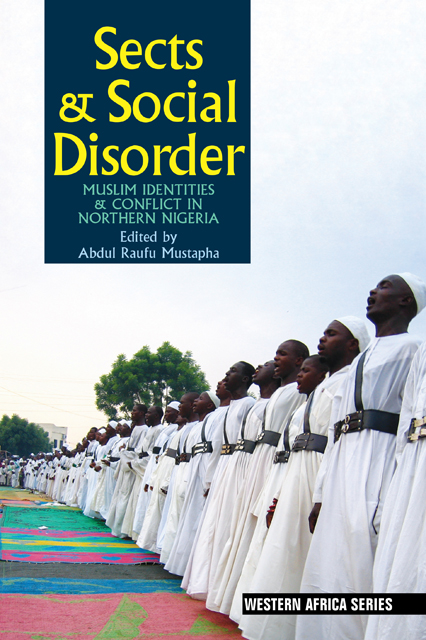Book contents
- Frontmatter
- Dedication
- Contents
- List of Maps, Figures & Tables
- Notes on Contributors
- Foreword by Muhammad Sani Umar
- Acknowledgements
- Glossary
- 1 Introduction: Interpreting Islam: Sufis, Salafists, Shi’ites & Islamists in northern Nigeria
- 2 From dissent to dissidence: The genesis & development of reformist Islamic groups in northern Nigeria
- 3 Contemporary Islamic sects & groups in northern Nigeria
- 4 Experiencing inequality at close range: Almajiri students & Qur’anic schools in Kano
- 5 ‘Marginal Muslims’: Ethnic identity & the Umma in Kano
- 6 Understanding Boko Haram
- 7 Conclusion: Religious sectarianism, poor governance & conflict
- Index
7 - Conclusion: Religious sectarianism, poor governance & conflict
Published online by Cambridge University Press: 24 February 2023
- Frontmatter
- Dedication
- Contents
- List of Maps, Figures & Tables
- Notes on Contributors
- Foreword by Muhammad Sani Umar
- Acknowledgements
- Glossary
- 1 Introduction: Interpreting Islam: Sufis, Salafists, Shi’ites & Islamists in northern Nigeria
- 2 From dissent to dissidence: The genesis & development of reformist Islamic groups in northern Nigeria
- 3 Contemporary Islamic sects & groups in northern Nigeria
- 4 Experiencing inequality at close range: Almajiri students & Qur’anic schools in Kano
- 5 ‘Marginal Muslims’: Ethnic identity & the Umma in Kano
- 6 Understanding Boko Haram
- 7 Conclusion: Religious sectarianism, poor governance & conflict
- Index
Summary
Introduction
In this concluding chapter, I seek first to draw attention to the violent conflicts that have often characterized doctrinal disputes between Islamic groups in northern Nigeria over the past decades. This historical context sheds further light on the phenomenon of Boko Haram. Second, I argue that this long-run process of religious sectarianism has been made worse by poor governance processes.
Sufism has been central to Islam in Sub-Saharan Africa since the fifteenth century (Kane 2003, 59). Over the centuries, many reform movements emerged within this Islamic milieu to reinterpret the earlier messages. Such reformist impulses were important reflectors or initiators of processes of social change, such as the jihad of 1804. But even these reformist movements remained within the fold of Sufi doctrine. It was not until the 1970s that we begin to see a serious challenge to the hegemony of Sufism with the emergence of Salafist and Shi’a groups in northern Nigeria. The rise of these new groups has led to the fragmentation of sacred authority (Kane 2003, 103) and the emergence of new ways of being Muslim. Today, the Muslim umma in northern Nigeria can be said to be fragmented along doctrinal, ethnic, and class lines. Unfortunately, these divisions have also fuelled conflict, some violent, within the Muslim community. A central objective of this book has been to make sense of these conflicts.
Indeed, it might be said that since the 1940s, the northern Nigerian Muslim community has experienced four overlapping patterns of violent conflict. The first pattern, from the late 1940s, but especially from the 1970s, is driven by doctrinal differences within Islam. The second pattern, seen largely from the 1950s, had an ethnic and regional logic at its core, but with strong religious undertones. The third pattern, discernible from 1980, was characterized by millenarian uprisings against the state and society by sects composed of marginalized and disgruntled Muslims, while the fourth, starting in 2009, is characterized by the emergence of Islamist insurgencies by groups like Boko Haram ( Jama‘atu Ahlul Sunna li Da‘awati wal Jihad) and Ansaru ( Jama‘atu Ansarul Muslimina fi Biladis Sudan) (Vanguards for the Aid of Muslims in Black Africa). Each of these patterns was also based on the politicization of religious difference, but some more so than others.
- Type
- Chapter
- Information
- Sects and Social DisorderMuslim Identities and Conflict in Northern Nigeria, pp. 199 - 222Publisher: Boydell & BrewerPrint publication year: 2014

